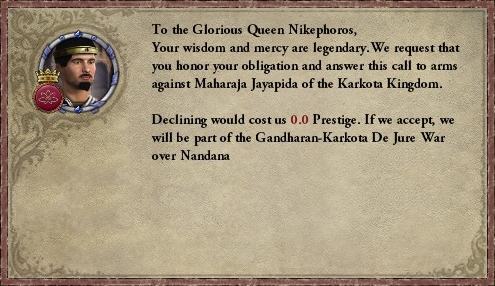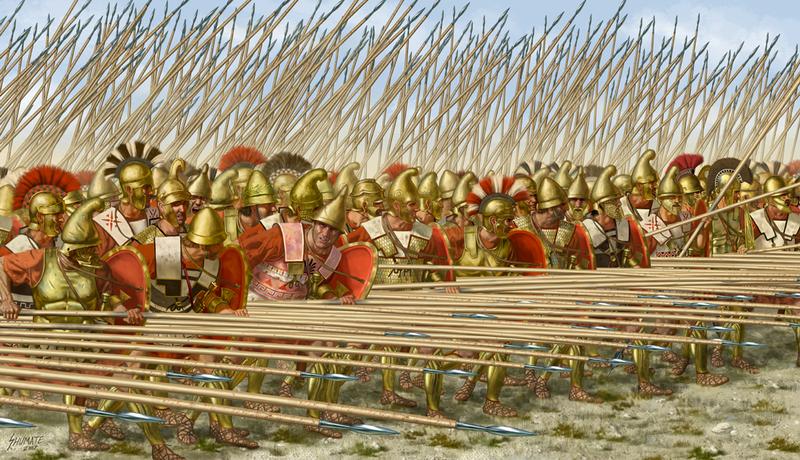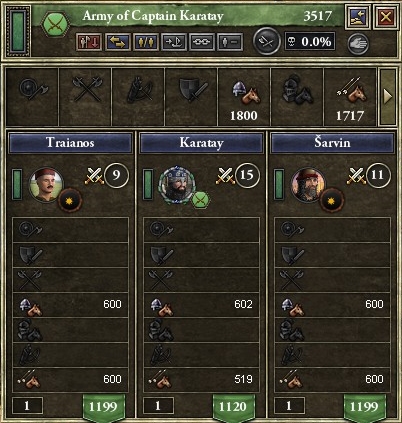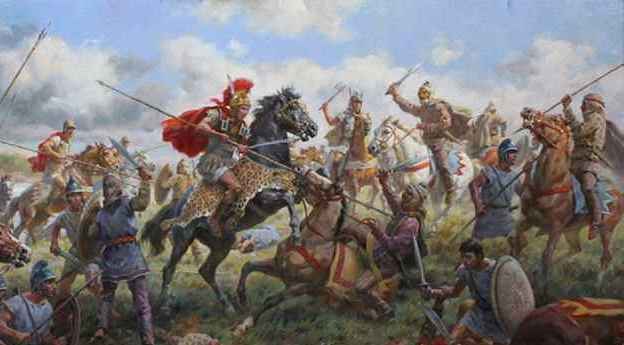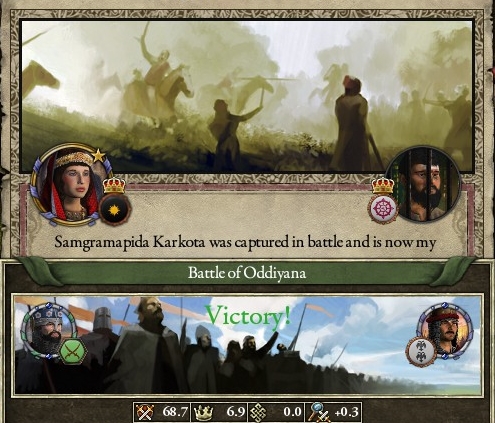Table of Contents / Introduction
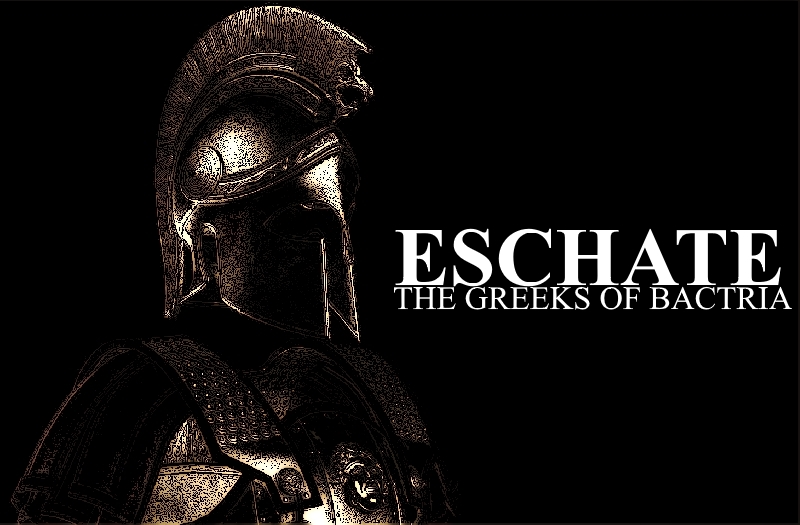
(Artwork by Spyros Frigas)
TABLE of CONTENTS
- [Introduction — This Post]
†‡†‡†‡†‡†‡†‡†‡†‡†‡†‡†‡†‡†‡†‡†‡†‡†‡†‡†
†‡†‡†‡†‡†‡†‡†‡†‡†‡†‡†‡†‡†‡†‡†‡†‡†‡†‡†
†‡†‡†‡†‡†‡†‡†‡†‡†‡†‡†‡†‡†‡†‡†‡†‡†‡†‡†
The first Greek kingdom in Bactria was founded in later antiquity, some seventy years after the death of Alexander the Great, by a Seleucid satrap of the region. Diodotus Sotor, unsatisfied with the inattentiveness of the distant Seleucid ruler Antiochus II, whose catastrophic blunders in the Syrian wars shook the empire to its core, declared his eastern satrapy independent from Seleucia. The young kingdom prospered, and its thousand cities became renowned for their opulent riches and bountiful harvests. That Kingdom, which lasted for a century and a half, was overtaken by Apollodotus's kingdom in India, which stemmed from a Magnesian host which drove further into Gandhara. This was succeeded by the Kushan Empire, which, despite being non-Greek in its origin, maintained Greek coinage and the use of the Greek language in official business for some time afterwards until its eventual subjugation by the Sasanian Persians. From thence we speak of the New Greek Satraps of Bactria.
First there was Diodotos I Philhellenos, who ruled a small satrapy in the Indian Caucasus. Through quarrelling, he reclaimed the city of Bactra from another satrap, ruling until his succession by his son Diodotos II. From the younger Diodotos, the mantle passed to his son Euthydemos, who would be the last Greco-Bactrian satrap to follow the ancient Hellenic religion. His son, Euthydemos II, would follow the way of Gautama Buddha, though he would die in his youth. Thereafter ruled Antimachos I, who passed the crown to Pantaleon, who was succeeded by Agathokles. To Apollodotos the crown went next, a relative of his predecessor from the Indic Greek lands, and a sympathetic to the Faith of the Hindus. From thence to Antimachos II the Half-Greek, and from then to his son Menander, who passed it on to Zoilos, who passed it on to his son Strato.

Rulers preceding Strato (excl. Diodotos I)
Strato would inherit the satrapy at the collapse of its master's Empire. The fall of the Sasanians at the hands of the expanding Muslim caliphate left a power vacuum in much the same way that the Syrian Wars crippled the Seleucid's ability to rule in the east. Unfortunately for Strato, he and his consort would die young with neither sons nor brothers to pass the mantle of the Bactrian crown to, and many of his more distant relatives declined the duty in fear of drawing the wrath of the Muslim Caliphs. The throne of Bactria, therefore, was left in the hands of his young daughter, Nikephoros.
It is the dawn of the Christian year 769. Bactria is once more a mighty and independent Kingdom with a Greek aristocracy. To the west, on the shores of the Caspian Sea, lies a tributary state — a Parthian-ruled state that is still faithful to Ahura Mazda. There is a great deal of trust between the Karen Satrap and the Bactrian Queen — not because of any mutual interpersonal respect, but for fear of the great Muslim Caliphate which has swallowed up the rest of the Empire of the Sasanids. To the east, the remainder of the Hindu Gandhara Kingdom clings to the foothills of the Indian Caucasus, ruled by the young and cool-headed Prokopios. It also exists under the suzerainty of the Bactrians, who aid it in its defense. To the south, a small handful of Pashtun kingdoms form a buffer between the lands of the Muslims and the lands of the Bactrians. They are fierce warriors who worship the Sun, which they call Zun in their younger Avestan language. The most powerful of these kingdoms is Zunbil, located in Kandahar. Across the deserts of Transoxania, Turkish Khans roam the open steppes of Siberia, and in the Ferghana Valley, the walled city of Alexandria Eschate — literally "the Furthest Alexandria" serves the easternmost bastion of Greek culture in the known world, nestled upon the Tang Empire's trading network.
Thus begins the story of our Kingdom, free and great, with the reign of the young Queen Nikephoros, the daughter of Strato Eukradites. A girl of but twenty years of age, but blessed with intelligence and charisma beyond that of her years — she is a kindhearted young woman of typical passions, literate in Greek, Bactrian, and Sanskrit, and gifted with the admiration of her peers. With her, the story of the Bactrian Kingdom of the Greeks truly begins in earnest.
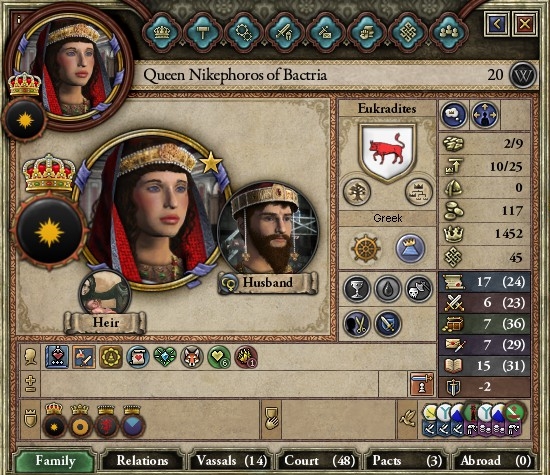
Last edited:



